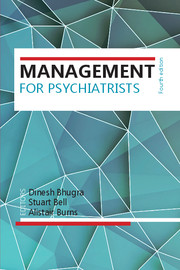Book contents
- Frontmatter
- Contents
- List of contributors
- List of figures, tables and boxes
- Preface
- Part I Theoretical overview
- Part II Changes and conflicts
- 11 Medical leadership skills: what is needed to be a successful leader?
- 12 Understanding systems
- 13 Working with the team
- 14 Managing multicultural and multinational teams in healthcare
- 15 Management of change
- 16 Managing the psychiatrist's performance
- 17 Revalidation for psychiatrists
- 18 Quality improvement tools
- 19 Quality and quality governance
- 20 Measurement of needs
- 21 Service users’ expectations
- 22 Clinical audit
- 23 Confidentiality and management in healthcare organisations
- 24 Patient complaints: every doctor's business
- 25 Mental health review tribunals. Or, tribunals, and how to survive them
- Part III Personal development
- Index
17 - Revalidation for psychiatrists
from Part II - Changes and conflicts
Published online by Cambridge University Press: 02 January 2018
- Frontmatter
- Contents
- List of contributors
- List of figures, tables and boxes
- Preface
- Part I Theoretical overview
- Part II Changes and conflicts
- 11 Medical leadership skills: what is needed to be a successful leader?
- 12 Understanding systems
- 13 Working with the team
- 14 Managing multicultural and multinational teams in healthcare
- 15 Management of change
- 16 Managing the psychiatrist's performance
- 17 Revalidation for psychiatrists
- 18 Quality improvement tools
- 19 Quality and quality governance
- 20 Measurement of needs
- 21 Service users’ expectations
- 22 Clinical audit
- 23 Confidentiality and management in healthcare organisations
- 24 Patient complaints: every doctor's business
- 25 Mental health review tribunals. Or, tribunals, and how to survive them
- Part III Personal development
- Index
Summary
Since 1858, the General Medical Council (GMC), which is a registered charity, has held a statutory function to maintain a list of medical practitioners registered in the UK. There has always been an expectation and duty that doctors maintain their professional competence throughout their careers but until now this assumption has not been monitored, nor enforced, except through processes relating to their fitness to practise. In 2009, all registered medical practitioners were routinely granted a licence to practise. However, since December 2012, when revalidation commenced, this licence has been subject to review every 5 years. Revalidation is important but questions have been raised about its validity. Some of the issues are covered in the previous chapter.
According to the GMC's website:
‘Revalidation is the process by which licensed doctors are required to demonstrate on a regular basis that they are up to date and fit to practise.… Revalidation aims to give extra confidence to patients that their doctor is being regularly checked by their employer and the GMC.’ (http://www.gmcuk. org/doctors/revalidation/9627.asp)
The change in legislation and guidance has created new relationships between doctors, employers, regulators, patients and the public. The full impact, costs and benefits remain to be seen.
History of revalidation
The Merrison report in 1975 introduced the concept of specialist training and certification and altered the composition of the GMC. It also suggested periodic tests of competence, but ruled these to be outside its terms of reference (Merrison, 1975). This task was passed to the Alment Committee, whose terms of reference were: ‘To review the present methods of ensuring the maintenance of standards of continuing competence to practise and of the clinical care of patients, and to make recommendations’ (Alment, 1976). The report, Competence to Practise, published in 1976, concluded that compulsory re-licensure was not indicated as it was too difficult but that professional development should be encouraged for all doctors on a voluntary basis.
Revalidation for the medical profession has therefore been under discussion for decades. Progress has been slow, through a series of government reports, the introduction of clinical governance, clinical audit and annual appraisal, and a series of scandals relating to doctors.
- Type
- Chapter
- Information
- Management for Psychiatrists , pp. 231 - 247Publisher: Royal College of PsychiatristsPrint publication year: 2016



